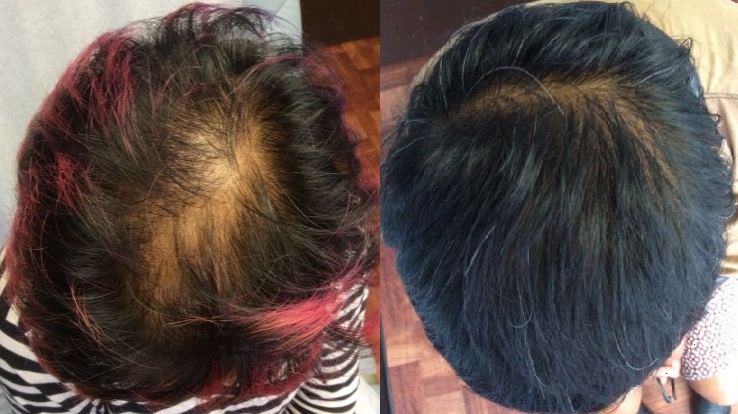
Stem Cell Treatment for Hair Loss
Mar 23, 2024Our hair often mirrors our health, and by the end of this article, you will learn about an exciting, safe, and nonsurgical solution for hair restoration: stem cell treatment for hair loss.
Did you know that nearly 50% of men and women experience hair loss at some point in their lives? A variety of factors can contribute to this, including autoimmune conditions, hormonal imbalances, age, stress, poor gut health, insulin resistance, and environmental toxins.
Types of Hair Loss
Different types of hair loss respond differently to treatment. Here are some of the common patterns:
-
Patchy Hair Loss
It appears as a smooth, round bald patch, usually caused by autoimmune disorders.
-
Male Pattern Hair Loss
Often seen as a receding hairline or bald spot at the top of the head, linked to genetic factors, testosterone, or DHEA imbalances.
-
Female Pattern Hair Loss
Characterized by widening parting and general thinning, commonly due to hormonal imbalances, stress, or nutrient deficiencies.
The Importance of Finding the Root Cause
Effective treatment begins with identifying the root cause. A thorough history, timeline, and assessment of other health factors help pinpoint contributing issues. Such as:
-
Nutritional Deficiencies
Low levels of copper, iron, vitamin B12, biotin, vitamin B5, amino acids, selenium, zinc, vitamins A, and omega-3 and -6 fatty acids can all contribute to hair loss.
-
Digestive Health
Proper digestion and absorption are vital for hair health. Issues like intestinal permeability or gluten sensitivity can impact nutrient uptake.
-
Inflammation & Hormone Levels
Systemic inflammation, thyroid, and sex hormone imbalances are key factors. For instance, undiagnosed hypothyroidism, a condition affecting one in five women and one in ten men, often causes dry, brittle hair. Insufficient conversion of T4 (inactive thyroid hormone) to T3 (active hormone) due to low selenium, iron, vitamins A and D, or liver issues can worsen hair loss.
-
Insulin Resistance
Insulin resistance, particularly in conditions like PCOS, elevates testosterone and DHEA levels, which can accelerate hair loss.
How to Treat Hair Loss: Fixing the Root Cause
The only lasting approach to addressing hair loss is by tackling its root cause. However, once this is done, several methods can stimulate hair regrowth:
-
Nutritional Support
Supplements or IV drips with essential nutrients like vitamin C, biotin, iron, zinc, vitamin B12, selenium, and amino acids can enhance hair health.
-
Low-Level Laser Therapy
Performed every other day, this therapy targets hair follicles to increase cellular metabolism and growth.
-
Topical Treatments
Diluted rosemary oil has been found as effective as minoxidil in some studies.
-
Mesotherapy with PRP
Platelet-rich plasma (PRP) injections stimulate hair growth by enhancing blood flow to hair follicles.
-
GHK-Cu Peptide
This peptide, discovered in 1973, promotes scalp blood flow, thickens hair, increases follicle size, and extends the growth phase by boosting collagen and elastin production.
What Is Stem Cell Therapy for Hair Loss?
Now we come to the innovative stem cell hair treatment, a powerful solution for those seeking nonsurgical hair restoration. Stem cells hair treatment uses stem cells derived from adipose (fat) tissue to strengthen weak follicles and potentially rejuvenate older ones. This method doesn’t require surgery and is considered a safe and natural approach. In this process, stem cells are injected into the hair follicles, enabling the growth of new hair.
How Effective Is Stem Cell Therapy for Hair Loss?
Does stem cell therapy work for hair loss? The early results are promising, with initial improvements visible after a few months. Stem cell therapy not only repairs damaged hair follicles but also supports the growth of stronger, healthier hair over time.
How long does stem cell therapy last for hair loss?
Results can vary, with most patients seeing continued improvement over several years.
Is Stem Cell Hair Transplant Permanent?
While results are long-lasting, is stem cell hair transplant permanent? The answer is that stem cell treatments can have enduring effects, but maintenance treatments may be needed over time. For individuals wondering, “Do stem cell injections work for hair loss?” clinical studies indicate high success rates, though outcomes can vary based on individual factors.
Stem cell hair treatment represents a promising frontier in hair restoration, offering a safe, effective, and minimally invasive approach to treating hair loss. This therapy continues to gain popularity as more people seek natural, nonsurgical options to combat hair thinning and loss.






 +971 4 518 5777
+971 4 518 5777